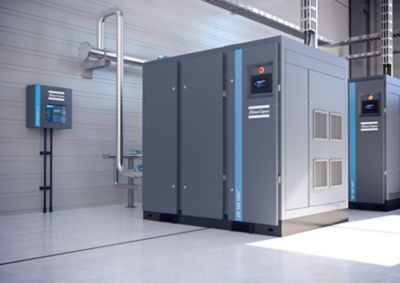Maintenance Tips for Piston Compressors
November 13, 2024
Piston compressors are renowned for providing a reliable and efficient compressed air supply in a wide range of applications, from private uses to demanding industrial processes.
To ensure that your piston compressor remains in optimal condition, regular maintenance is crucial. This guide provides an overview of essential maintenance work on piston compressors, as well as tips on how to rectify the most common malfunctions
Maintenance and Troubleshooting of Reciprocating Compressors
Regular maintenance is key to keeping your piston compressor in good shape. In this article, you will get insights into the maintenance work that should be carried out regularly. You'll also learn how to identify and resolve common issues and disruptions.
Routine Maintenance Checklist for Piston Compressors
Checking and changing the oil: Every 500-1000 hours of use or as recommended by the manufacturer
Inspect and replace air filters: Every 3 months or 500 hours of operation, whichever comes first
Monitor belt tension:Monthly or after every 100 hours of operation
Clean air inlet openings: Monthly or as needed
Piston Compressors: Troubleshooting Common Problems
Even with regular maintenance, issues can arise based on the compressor’s quality and usage frequency. It is important to say that lower-quality compressors are much more susceptible to these problems, as they are often manufactured with cheaper and simpler components.
Here are some malfunctions and their possible problem descriptions:
| Problem | Possible Causes | Solutions |
Compressor does not start |
Power supply issues |
Check the power cord, plug, and outlet for problems. If defects are found, discontinue use immediately. |
Defective pressure switch |
Check and test pressure switches; replace if necessary |
|
Overheating |
Allow the compressor to cool down and check proper ventilation. Remember, piston compressors are not designed for continuous operation. |
|
Compressor makes unusual noises
|
Loose components (Rattling, clanking) |
Ensure all screws and bolts are tightened. Never operate the compressor with loose fittings. |
Worn bearings |
Check and replace bearings. |
|
V-belt issues (Squeaking) |
Check and adjust the V-belt tension or replace the belt if it wears out. |
|
Compressor builds up insufficient pressure
|
Air Leaks |
Check for air leaks. |
Valve issues |
Inspect and maintain intake and exhaust valves |
|
Piston & Cylinder issues |
Check piston rings and running surfaces of the pistons and cylinders |
Safety Tips
Before performing any maintenance or repair, you should always carry out safety checks to avoid accidents. Disconnect the compressor from the power supply, release the pressure in the system, and wear appropriate protective equipment.
Further Information
By following this guide, you can ensure that your piston compressor remains reliable, efficient, and long-lasting. Regular maintenance not only prevents costly repairs, but also extends the life of your equipment, making it a valuable investment for your business. Remember that for continuous operation, screw compressors are a better choice as they are designed for such requirements.
For detailed manuals, videos and additional information on maintenance and repair of reciprocating compressors, visit our website or contact our customer service.
Learn more about piston compressors
FAQs
Can I run my piston compressor continuously?
Not really: Most piston compressors are not designed for continuous operation. Ideally, they should run for 40 minutes and then be paused for 20 minutes. For more extended use, consider scroll compressors which can be operated continuously for longer phases at a time (but , in total no more than 2000 - 3000 hours per year) or screw compressors for 24/7 operations.
How often should I service my piston compressor?
Maintenance frequency depends on usage and manufacturer recommendations, but regular checking is crucial.
What type of oil should I use?
Always use the manufacturer's recommended oil to ensure the best performance and longevity.
Can I do the maintenance myself?
Simple maintenance tasks can be done on your own, but for more complex issues or uncertainties. We recommend consulting a professional. If you have purchased your compressor from a specialist dealer, contact your dealer or the manufacturer.
Check whether it can be damaged by self-carried out maintenance.
When should I consider switching to an industrial-grade piston compressor?
If you are frequently facing breakdowns, it’s worth considering an industrial-grade reciprocating compressor. In general, however, you should determine beforehand which compressor type is the most suitable for your application.

